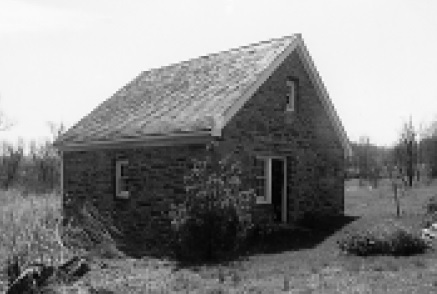Archives of Maryland
(Biographical Series)

Brookeville Woolen Mill
Brookeville,
Montgomery County, Maryland
Founded and owned by
David Newlin, c. 1812-1826
Information:

An outbuilding
associated with the mill. M-NCPPC Historic Preservation
office, Montgomery County Planning Department.
Despite
a short period of prosperity for Newlin, the
embargoes were lifted at the end of the war, and the profitability of
domestic woolen manufacturing took a steep downturn.3
The
overhead cost of building and maintaining his mills was
enormous, and the local demand for his manufactured goods could not
have
been high in a town of only fourteen homes. Transporting these textiles
to markets was another added expense in this landlocked area. While
mills in the Baltimore environs could rely on inexpensive urban labor
and easy access to waterways, Brookeville provided none of these sorely
needed advantages. By
1826, Newlin had sold the failing woolen mill to Jehu Price, who
would in turn run into financial troubles and be forced to sell the
mill in 1832.4
For a more detailed description of Newlin's mills and their
operations, see the biography of David
Newlin.
Jackson Gilman-Forlini
and Kyle Bacon, DAR
Research Fellows, 2012
Notes:
- MONTGOMERY
COUNTY COURT
(Land Records) Deed, Aquila Taylor to David Newlin, December 9, 1812,
Liber Q, p. 179 [MSA CE 148-17].
- Advertisement,
"Brookeville Woolen Factory," The
Georgetown Messenger,
June 15, 1816; Fourth Census of
the United States, 1820, Manufactures (Washington, D.C.:
National Archives, 1965) p. 199, 22, 239:
In this census, Newlin states that his mill had been in full operation
for "about one year," and that it was "for the use of the neighbors
& customers."
- Newlin's
personal property remained stagnant throughout much of the years
following the War of 1812. He owned very little silver plate (a
status symbol) compared to his neighbors and he purchased many of his
household items and furniture second-hand. Therefore, it
seems
likely that his profit margin was negligible at best, and negative at
worst. For
examples of personal property valuations
see: MONTGOMERY COUNTY COMMISSIONERS OF THE
TAX
(Assessment Record) 1813 and 1820
Assessments, Districts 1 and 4, MdHR
20,115-3-1 [MSA C1110-3, 01/18/14/019];
Newlin purchased many household items between 1803 and 1819, which are
documented in bills of sale stored with the Montgomery County land
records. These items were taken from the private estates of his
neighbors and were presumably for personal use. For an example of one
such purchase, see
MONTGOMERY
COUNTY COURT (Land
Records) Bill of Sale, Cesar Williams to David Newlin, November 15,
1819, Liber V,
p. 20 [MSA CE 148-23].
- MONTGOMERY
COUNTY COURT (Land Records)
Deed, Jehu Price to Amos Farquar, August 24, 1832, Liber BS 5,
p. 279
[MSA CE 148-31]; MARYLAND
HISTORICAL TRUST (Inventory of Historic Sites) Brookeville Woolen Mill,
M: 23-69, Montgomery County [MSA SE5-17396];
No official record exists for Newlin's sale of the mill to Jehu Price.
However, Price is marked as owning the property in the following record: MONTGOMERY COUNTY
COMMISSIONERS OF THE TAX
(Assessment Record) 1826 Assessment,
District 4, MdHR
20,115-3-1 [MSA C1110-3, 01/18/14/019].

 ©
Copyright
©
Copyright  Maryland State Archives
Maryland State Archives


 An outbuilding
associated with the mill. M-NCPPC Historic Preservation
office, Montgomery County Planning Department.
An outbuilding
associated with the mill. M-NCPPC Historic Preservation
office, Montgomery County Planning Department.

